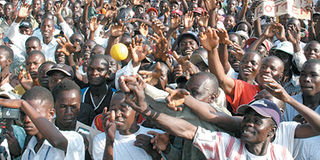Big strides made since 2005 referendum

A referendum rally in Kenya in 2005. Photo/FILE
This year’s referendum campaigns differed dramatically from that of 2005 because it was issue-based. That of 2005 was marked with ethnicity, regional and political partnerships, analysts say.
“Kenya’s democracy, election campaigns and systems in 2005 referendum are not the same as today’s” said Kenya National Commission on Human Rights official Hassan Omar on Thursday.
Kadhi courts
“Those opposed to the proposed constitution focused on abortion, land and kadhi courts, while the ‘Yes’ was composed of people from across parties,” Mr Omar said. Campaigners tonned down hate threats with most displaying some sobriety.
The presence of institutions such as the National Cohesion and Integration Commission formed with the mandate of dealing with hate speech also raised the bar on those wont to make inciting remarks.
According to National Cohesion and Integration Commission chairman Mzalendo Kibunjia, hate messages through mobile phones and e-mails that fuelled tensions prior to and after 2007 elections dropped drastically.
The Interim Independent Electoral Commission conducted the referendum in a transparent manner, keeping Kenyans informed through updates.
The government further heeded early warning signs and deployed security personnel to hot spots, unlike in 2007 when it was caught napping.
Kenyans were also more prepared, Mr Omar said, and had realised there was no need killing each other.
Political analyst John Mureithi Waiganjo, also a Nairobi lawyer, said Kenyans had matured, and did not follow politicians or religious leaders.
Mr Waiganjo said the referendum further showed Kenyan politics had come of age as there was no voter apathy.
Mukurweini MP Kabando wa Kabando, whose constituency recorded 91 per cent turnout, said that security was good and that the electoral commission lived up to its responsibility.
National prayers involving all clergy should be conducted across the country within a month, he added.
“Green Politicians should reach out to all Christian clergy for reconciliation and solidarity for collective sharing on national renewal, rebirth and proclamation of the Second Republic,” he proposed.
The ongoing solutions to end long-term problems agreed under Agenda IV of the National Accord have also given Kenyans hope.
Under the agreement, the PNU and ODM agreed to put Kenya back on the road to sustainable peace, stability and justice.
According to research by Kofi Annan mediation team, which helped broker peace, many Kenyans have confidence in the International Criminal Court because local attempts have failed to deliver justice for the victims.
The International Criminal Court presents not only the hope for ending the culture of impunity, but also a window of opportunity for genuine reforms.
The Annan team said in July that more communities were getting along better with one another compared to 2008.


